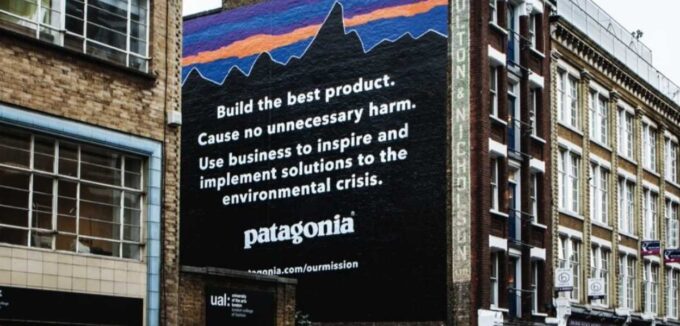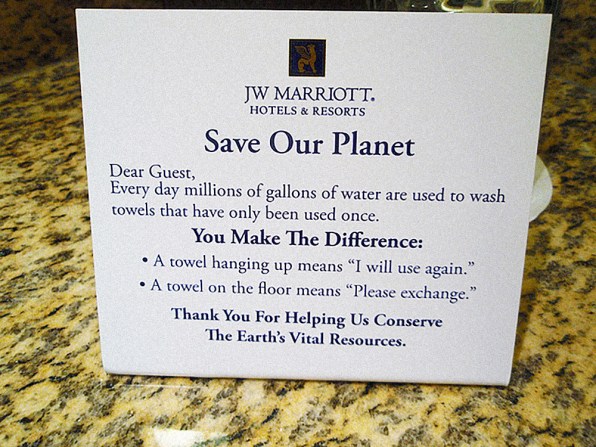
The end of corporate passivity: Why business leaders must shape geopolitics, not just react to it
To thrive in a fragmented world, business leaders must stop being passive spectators and start actively shaping geopolitics, urges IMD’s Arturo Bris...

by Frédéric Dalsace Published July 13, 2023 in Sustainability • 6 min read
Marketing has often been seen as a way of driving people to consume more, but this is a role that is becoming less relevant as customers become more concerned about sustainability. Yet this does not mean that marketing cannot continue to serve a useful purpose.
Admittedly, marketing has sometimes had a bad image. It is seen as excessive, consumerist, prone to exaggeration, and complicit in overusing resources and polluting the environment. For many, it is the visible face of capitalism. And they do not mean this in a good way. When they think of marketing specialists, they conjure up a picture of people who are slightly too flashy, self-assured, and insincere.
If marketing continues to be the servant of the greenwashing industry, this bad reputation will continue. Take the example of Air France, which proudly proclaims it has introduced eco-conscious comfort kits for premium economy travelers made from 93% recycled materials. Yet this measure will do little to address the true problem of emissions in the airline industry.
I believe that marketing is at a crossroads. We can find new clever ways of greenwashing, or we can redeem our reputation and use the power of marketing to make ourselves and the world more sustainable. Marketing is part of a solution that can enable us to move from a focus on growth at all costs to a more sustainable society.
We marketeers are therefore more important than ever. Personally, when I think of marketing and communications, I visualize people in white lab coats, social explorers, inventors of the future, people who can craft a narrative about new discoveries.
In my view, marketing fulfills three roles in business and society.
First, the marketing function can serve as an important sensor for any company. A good marketing team spots social trends and changes long before anyone else notices them. This is also true for ESG issues. Before environmental issues became a hot topic of conversation at drinks parties, some companies, such as sportswear manufacturer Patagonia, were already putting them at the heart of their business. The same goes for diversity issues. Smart companies no longer only use white models in their advertising.

I lived in Japan for six years. People there know that when you see the tsunami, it’s already too late. It’s important to recognize the smallest signs early and react quickly. Similarly, some pioneering businesses saw the sustainability tsunami coming and acted accordingly.
Take the dishwashing detergent Finish. At first glance, it is not exactly an environmentally friendly product, as modern dishwashers still need about 10 liters of water for one wash cycle. By contrast, anyone who washes dishes by hand uses 100 liters of this valuable raw material. And anyone who pre-rinses the dishes before putting them in the machine uses 50 liters of water. Finish manufacturer Reckitt decided to revamp the product and build a campaign around the slogan “Skip the Rinse”. The message caught on, fewer people pre-rinse, and Reckitt gained market share. This example shows that those who detect consumer trends and issues and respond accordingly are ultimately successful in business – and at the same time trigger a positive development.
Second, and this follows from point one, the analyses of good marketeers stimulate companies to offer new products and services based on these new social and environmental changes, such as the shift away from buying to renting products and services.
Here’s a surprising example from an industry that’s also not considered to be the most environmentally friendly. Tire manufacturer Michelin started selling its tires as a service, renting them to logistics companies who pay based on distances driven. This leads to a completely different mindset from the earlier model of selling tires to customers. As a manufacturer, I’m suddenly no longer interested in the tire needing to be replaced as soon as possible, but on the contrary in getting as much use as possible out of the tire and out of all the resources used to make it. I want the tires to last as long as possible – the longer the tires run, the more money I make.
And this obviously has an impact on product design. Changing the business model results in a better product that is subject to less abrasion, therefore causes less pollution, and needs to be replaced and disposed of less often. All of this has a positive impact on the environment.
But most importantly, it’s also a business model that is benefitial for the company. Sustainability doesn’t have to mean less profitability. And Michelin can use the same model to streamline its own operations. Why should it buy printers, computers, and compressors instead of renting them? Rather than buying rubber presses, it can simply rent them and let its suppliers take care of maintenance, in turn committing the manufacturer to ensure that the presses last for a long time.

Marketing should be at the forefront of the XaaS (Everything as a Service) revolution, and since it plays a key role in the early stages of new product and service development, marketing teams should systematically insist that sustainability elements are included in new offerings.
Third, marketing can use its knowledge of consumer behavior to steer customers in the direction of more sustainable consumption. Here’s a small example of what this knowledge can do – with great effect. All of us are familiar with the stickers in hotel bathrooms that tell us not to throw the bath towels on the floor, but to reuse them whenever possible.
Most of the time, we don’t even read them anymore because we think we know what’s written on them. But studies have shown that even a small change in wording, based on a thorough understanding of consumer behavior and attitudes, results in 30% of hotel guests reusing their towels. That helps the hotel with its laundry bill. But it also helps the environment, as less energy and water are used.
All these examples show that the change to more sustainability is possible, and that profitability need not suffer as a result. They also suggest that a movement has already been created – perhaps even a tsunami – and that all those who do not move, or who are satisfied with greenwashing instead of greendoing, could be swept away by it.
The three roles that I have identified – sensor, innovator, behavior changer – show why marketing departments should be seen as research teams for a more sustainable future and not as fiendish drivers of consumption. This is why I firmly believe that this profession can play a critical role in leading us to a more sustainable future, a future that may look very different from the past.
I am convinced that we have reached the end of the abundance society – for both climate and energy policy reasons. It is highly likely that we are moving into a “post-growth” phase in many highly developed countries and societies – and that is positive.
As Michelin’s example shows, companies can adopt a business model that does not rely on increased consumption of limited resources but instead seeks to make the best use of these resources in a way that is also profitable.
If marketeers fulfill the roles that I have described, then we are on the right track. And that’s why I’m such a committed advocate of marketing – because I believe it is important for the future.

Professor of Marketing and Strategy at IMD
Frédéric Dalsace focuses on B2B issues sustainability, inclusive business models, and alleviating poverty. Prior to IMD, he spent 16 years as a Professor at HEC Paris where he held the Social Business / Enterprise and Poverty Chair presided by Nobel Laureate Professor Muhammad Yunus. Prior to his academic life, Frédéric accumulated more than 10 years of experience in the business world, both with industrial companies (Michelin and CarnaudMetalbox) and as a strategy consultant with McKinsey & Company. At IMD, he is Director of the Integrating Sustainability into Strategy program.

June 23, 2025 • by Arturo Bris in Governance
To thrive in a fragmented world, business leaders must stop being passive spectators and start actively shaping geopolitics, urges IMD’s Arturo Bris...

May 19, 2025 • by Peter Voser in Governance
Board members have a central role to play in helping organizations steer a safe path in a polarized and skeptical world....
 Audio available
Audio available
April 28, 2025 • by Jordi Gual in Governance
Companies pursuing ESG goals increasingly face a backlash from shareholders who fear a drop in financial performance. Changes to corporate governance may be needed to restore trust on both sides of the...
 Audio available
Audio available
March 27, 2025 • by Jennifer Jordan, Alexander Fleischmann in Governance
Take our quiz to see if you're well-placed to implement new European rules on boardroom equality....
 Audio available
Audio availableExplore first person business intelligence from top minds curated for a global executive audience